Thunderbolt on Windows Part 2: Intel's DZ77RE-K75 & ASUS' P8Z77-V Premium
by Anand Lal Shimpi on June 3, 2012 2:08 AM EST- Posted in
- Motherboards
- CPUs
- Intel
- Asus
- Thunderbolt
- Ivy Bridge
- Chipsets
Hot Plug & Promise Pegasus, Now Supported Under Windows
For the past year, hot plug of Thunderbolt devices hasn't been supported under Windows—even on a Mac running Boot Camp. Any Thunderbolt device had to be present at POST for it to appear under Windows. In order to have a certified motherboard, BIOS/UEFI workarounds have to be present to allow for Thunderbolt hot plugging under Windows.
With a certified motherboard and a Windows certified Thunderbolt device, hot plug does work as you'd expect it to.
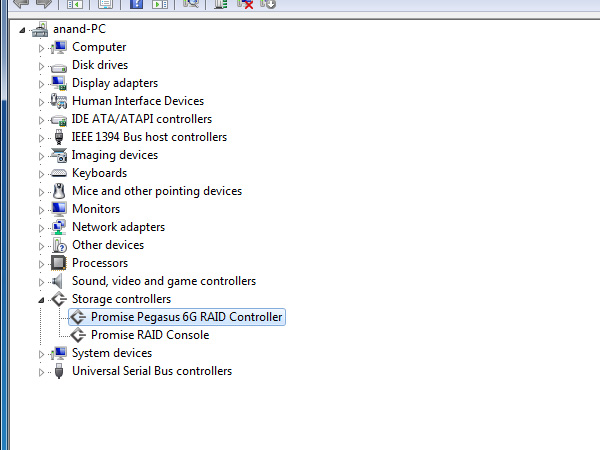
Promise provided us with a beta driver and firmware update that allowed us to use the Pegasus R6 under Windows. Hot plugging worked just fine.
The Promise Pegasus utility under Windows is actually a web based interface, but it provides the same basic functionality as the equivalent OS X application.
What happens if you don't have a certified driver? One of three things can happen. The device will either not work at all, it will compromise stability, or it will work but with some issues. The LaCie Little Big Disk is the perfect example of the last option. I just got a beta certified driver, but prior to receiving it this is what would happen when I plugged it into a running Windows system:
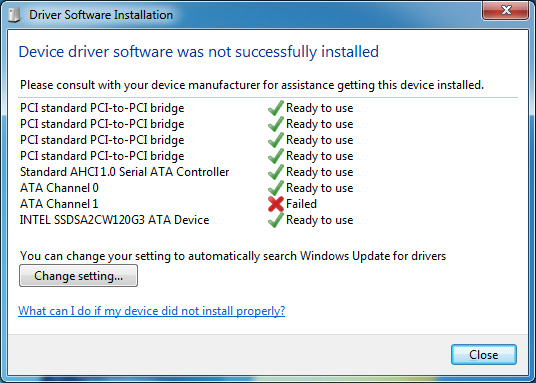
Only one of the two internal SATA channels was detected, meaning only one of the two internal drives was accessible. A reboot fixed this however.
The Elgato Thunderbolt SSD and Seagate's 2.5" GoFlex Thunderbolt adapter both use a different (lower power) SATA controller in order to stay below the 10W limit for a bus powered device (the cable, SATA and pre-Cactus Ridge Thunderbolt controllers combined already eat up around 5W).
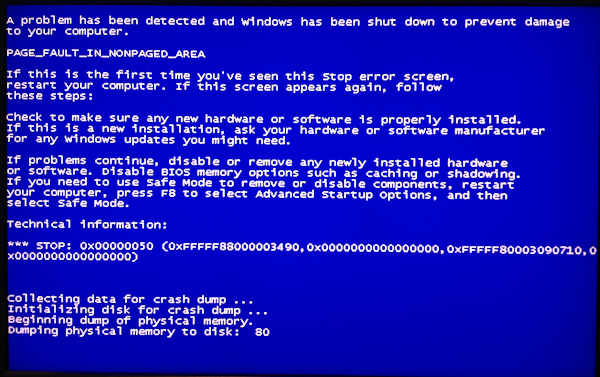
Unfortunately the ASMedia controller in these devices doesn't work well without a certified driver. Simply attaching the Elgato drive to a running Windows PC can cause a BSOD. Neither drive would even show up on either of the motherboards I tested; we'll simply have to wait for a certified driver here.
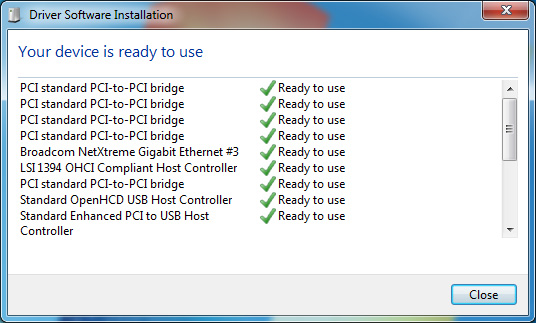
Apple's Thunderbolt Display works but not without a bunch of caveats. First you'll need access to a Mac to extract the drivers for the integrated components in the display (Firewire 800, GigE, etc.). Audio will work but only if you don't have a discrete GPU plugged into the motherboard. Firewire 800 and GigE both work. The integrated USB hub on the other hand basically doesn't work under Windows. Apple doesn't officially support the Thunderbolt Display under Windows and Intel won't certify it without Apple's support so anyone wanting to use a Thunderbolt display will just have to wait for someone else to release a similar product.
Remember the weird audio frame dropping issue I encountered under OS X with the Pegasus and Thunderbolt Display? I also encounter a similar but less severe version of that under Windows. While writing to the Pegasus and playing music through the Thunderbolt Display's speakers I get dropped audio frames, but unlike under OS X the music continues to play and is mostly recognizable—it just sounds like there's a little bit of static in the background. It's interesting that the problem exists under both OSes, but with slightly different behavior.


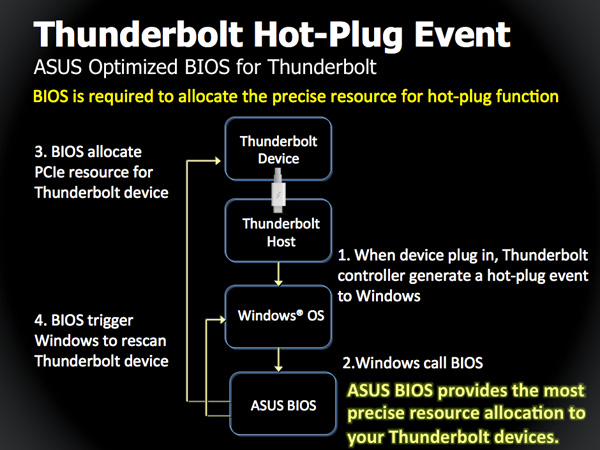
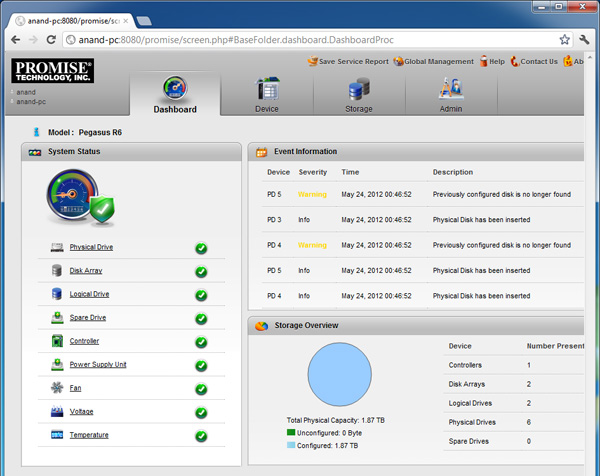














116 Comments
View All Comments
Pneumothorax - Monday, June 4, 2012 - link
I'm a heavy mac user with 2011 MBA, MBP, and 27 imac. AND I currently hate the implementation of TB. As of now you still can't get a TB hard drive for <$300 without gerry-rigging the seagate adapter with a 2.5" HDD as it also has problems with many SSD's. Very bitter as I drank the Apple kool-aid expecting wide-spread adoption after waiting over a year.repoman27 - Monday, June 4, 2012 - link
Skepticism about Thunderbolt is perfectly fine. Debating its merits versus the alternatives also fine.In the middle of an already polarized thread, posting statements devoid of a single valid premise could be considered trolling. The same goes for stereotyping and attacking a particular group, e.g. all Mac users.
I probably spend too much time "defending" Thunderbolt, but it has little to do with Apple pushing it. I primarily use laptops, and often wish for higher bandwidth I/O solutions than ExpressCard can provide, so I've been following the technology closely.
SamuraiArtGuy - Tuesday, June 12, 2012 - link
Apple is very conspicuously positioning Thunderbolt as the new "everything" high-speed port...Was interesting to note on the new (very Pro-class priced) retina Macbook Pro... no more Fire Wire, no Ethernet, no optical drive. Apple figures we're DONE with all that. (we'll see.. I've a stack of FW devices ) But they DO include USB 3 (which they get essentially for free with Ivy Bridge ) and rather interestingly, an HDMI port.
B3an - Sunday, June 3, 2012 - link
Does Win 8 natively support Thunderbolt? Like it now does with USB 3.0. As in, it no longer needs 3rd party drivers so will just immediately work on a clean install.ananduser - Sunday, June 3, 2012 - link
No, Windows does not support TB and MS has claimed that it will never support TB natively(for the time being) because it is plagued with security issues. Of course a hypothetical massive adoption of the interface might lead to native support. So it's safe to say that if things don't improve in the driver sector TB will remain a niche as FW.Penti - Sunday, June 3, 2012 - link
Why are you trolling? TB is just PCIe, the only issue is hotplug. Windows support hotplug just fine. Prior drivers or BIOS/Firmware might not. It's no more of a security risk then a Expresscard slot which lots of business PC's has. Or for that matter any internal Mini PCI Express slots. Or firewire. Or for that matter USB which is also exploitable to some degree. It's not up to Microsoft or Apple to decide which Thunderbolt appliance they support. Your fully capable to install the drivers yourself. For professional users with notebooks FW or Expresscard definitively isn't an option they need the extra bandwidth it provides for their tools/hardware to work. Without it they need to go to desktop/workstation towers. So there will be strong support. Most hardware won't be supported natively in Windows. If standard drivers works with your device it will work fine no matter OS, those might be shipped with the OS and some might not.They have no reason to differentiate drivers supporting hotplug with TB and not/old ways of doing things. When support is rolled in it's there. No different to what it has always been. Then again it's not about support for TB but the actual hardware you connect so the question is kinda wrong. There are Thunderbolt devices which don't work natively without 3rd party drivers for OS X too. So I don't see the fuss. External drives won't really move between OS's any way because Windows won't read HFS+ volumes and wise versa with NTFS pretty much. As long as the sata controller receives support your fine though.
B3an - Sunday, June 3, 2012 - link
I obviously only asked if Win 8 will natively support the Thunderbolt chipset controller. I don't care bout anything else. Win 8 now works with the USB 3.0 controller on my motherboard, so I dont have to install 3rd party drivers for it to function and be recognised in Device Manager. It would be convenient to have the same native support with Thunderbolt is all. So it just works.And a lot the time you don't have to install drivers for USB hardware, for instance most types of USB storage, printers and wifi cards do not need any 3rd party driver to function on Win 8 RP. If MS natively supported Thunderbolt I'd expect the same for many TB devices as well, especially storage.
Besides, Win 8 has drivers for tens of thousands of devices. It correctly installed display drivers for my CrossFire 6870's, webcam, USB devices, and even everything for my high-end motherboard.
Penti - Sunday, June 3, 2012 - link
The Thunderbolt chip and protocol is fully transparent, it's just a PCIe bridge/switch and transport solution. The OS never sees it as some odd device. In practice it no different then that Expresscard adapters need to support hot plug when it comes to consumer stuff. Some hardware always requires third party drivers, it does on Mac too. There is no difference here between Macs support and OEM PC vendors support.OEM-drivers and so on won't be shipped by Microsoft with Windows and lot of the drivers are lite versions not containing the full functionality.
USB-hardware normally don't need any drivers because they conform to HID, Mass-storage or MTP standards. Those standards are built into the USB-stack and the USB device only speaks the USB protocol and standards. It's kinda like supporting TCP/IP. Other devices often need drivers for full functionality but limited functionality drivers are usually already there. It was in Windows 7 and so on too. Network drivers and so on has been included in some form for decades in Windows.
In a short answer it already has support for the Thunderbolt chipset. It might not have support for the Thunderbolt device, but that is fully up to the developer / vendor as usual. Thunderbolt isn't a storage interface, Microsoft might support the SATA controller used just as they might support a Expresscard adapter for storage usage, might support your on-board PCIe controllers, or they might use a chip that has no Windows support yet to speak of or is newer then anything Microsoft has packaged with their software. We have supported hot plug of PCI devices all the time pretty much. There has always been issues when the hardware added to those don't support it properly or the drivers don't, or BIOS/firmware issues nothing new here. It's exactly the same thing as an internal PCIe card, or an Expresscard adapter or any integrated PCIe solution. As long as there is driver support (and no BIOS/firmware issues) it works fine. There is no controller for the OS to speak with here, it's not like USB or Firewire, the OS speaks directly to the hardware. It already knows how to speak over the PCIe bus.
Plenty of stuff will never get Windows 8 drivers for that matter. Mostly older stuff however.
If Lacie or Promise had used old SATA2-controllers they might already had worked on Windows. TB don't complicate it any more then an ExpressCard to eSATA adapter. In fact there is even ExpresCard-cabinettes for Thunderbolt. It's mainly a feature of PCIe which Windows already has native support for when it comes to the actual Thunderbolt solution. I obviously answered the troll, and also said that your question was the wrong one. The hardware will show up as native hardware. When that native hardware is supported you will have support. It just works if you have the PMC-Sierra/Promise drivers just as the article says. There is nothing more to it when it comes to the OS at least.
Apple probably will provide support for their stuff at some point because they support bootcamp. So look for any drivers there at whatever point they decide to do this.
ananduser - Monday, June 4, 2012 - link
Why are you so passionate about TB? I recall a specific statement by MS that they won't natively support TB. They do support USB natively. The article itself claims that there are some driver/firmware issues needing ironing out.Stop calling people names next time.
Penti - Friday, June 8, 2012 - link
Please provide information and a reference instead of your baseless FUD. Microsoft does support hot plug on PCIe and PCI bridge devices. There is nothing exotic about PCIe. Or extending it externally. They won't stop Thunderbolt working natively, I'm sure some of the drivers included works with it just fine. It's just the same thing as custom USB-devices will need their own drivers when it comes to the actual devices, there is no Thunderbolt driver to be had. The drivers will be the same as if it was a expresscard adapter or some such. If the PCIe controller drivers (which might be there, might not) support it, and supports hotplug it will work with no effort. The difference here is there needs to be a USB-driver supporting the USB-chipset/controller. That drivers happens to be universal against the USB spec, nothing strange. I haven't called anyone names, you where committing an act it should be described as such.Intel validates and certifies Thunderbolt for Windows PC's so how do you think it would not work or wouldn't be supported and what do you get out of suggesting it won't support it. Or that it would be for any security issue which also plagues Expresscard, Firewire, accessible Mini PCIe slots and to some degree buggy USB-drivers. There is no stance against the PCI bridge that TB is here. PCI-bridges are used inside platform chipsets and so on and Windows wouldn't work without supporting them.
So BIOS/UEFI problems with hot plugging and lacking drivers for peripherals under the Intel Thunderbolt certification program will solve those issues on any hardware with official support made for Windows. Those hasn't officially released yet and unsupported stuff will of course work less better. Apple eventually has to be on the game too but they will lag behind when it comes to compatibility (ACPI issues mainly) under Bootcamp / Compatibility Mode. You don't need to change the OS or to support any "controller" to fix those issues. After all they managed to do it with PCMCIA, CardBus, ExpressCard and so on. Technically it is the same and supported by the same standard as hotplugging other PCIe devices like Expresscard which BIOS/UEFI (standards need to be implemented, but they largely are already) and Windows does support. It's no new technology there to be seen by the OS or Firmware. Thunderbolt are transparent and invisible in that sense, just as it's the network drivers that talks Ethernetframes and not the OS TCP/IP stack. The thunderbolt transport isn't visible and there is no controller for the hardware that needs any drivers/tunneling it's just PCIe bridges and switches. It just falls under the PCIe root complex of the cpu. No nothing stranger.